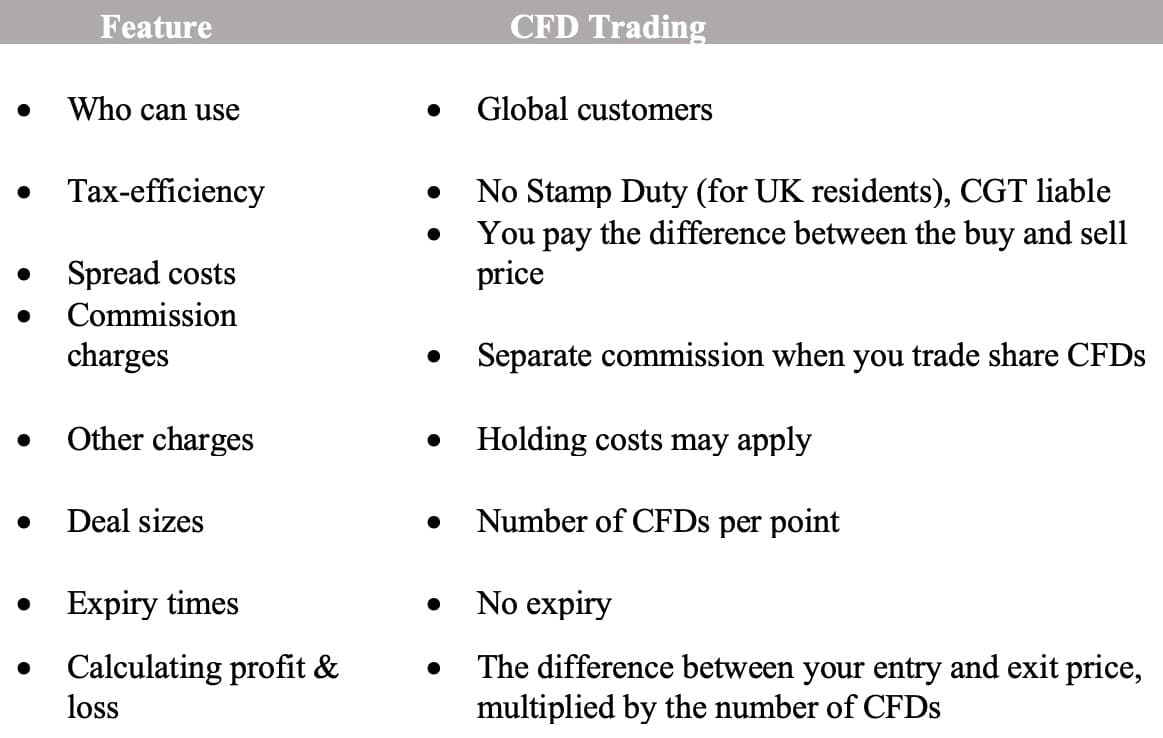CFDs are complex financial derivatives based on an underlying market. They enable you to benefit from both rising and falling markets across a vast range of financial instruments, including Forex , stocks, indices and commodities.
CFD stands for ‘contract for difference’ – when you trade a CFD, in effect you enter into a contract with the broker whereby you agree to exchange the difference in the price of the asset between the points at which you open and close the contract.
Advantages include:
- You can potentially make profits without actually owning the underlying asset
- You buy or sell contracts which represent an amount per point in that market
- As you don’t own the underlying asset, you don’t pay stamp duty on any profits in the UK (tax treatment may be different in a jurisdiction other than the UK)
It is also important to remember that, as with all financial instruments, there is always the possibility of losses as well as profits. That’s why it is vital to trade CFDs with caution, and to never invest more capital than you can afford to lose.
How does CFD trading work?
Leverage
CFD trading allows you to open positions and trade with a high degree of leverage. This means you can gain exposure to financial markets without having to put up the full cost of the position at the outset.
- In a normal trade — say you wanted to buy 100 Facebook shares – you would have to pay the full cost of the shares up front. However, with a leveraged product like a CFD, you might only have to find 20% of that cost.
It’s important to remember that a CFD is a margined product. This implies that both profits and losses can be magnified compared to your initial outlay, with losses exceeding your deposit. This is because they’re based on the full value of the position.
Rising or falling markets
Trading CFDs allows you to trade both sides of the market – you can go short (sell) if you think prices will fall or you can go long (buy) if you think prices will rise. This is because you buy or sell a number of units of your chosen financial instrument, depending on your view of whether prices will go up or down.
- Let’s say you think the price of oil is going down. CFD trading enables you to sell oil with the aim of profiting from the predicted price moving lower. If you’re right, you can buy oil back at a lower price to possibly make a profit.
Remember, you’re not buying or selling the physical commodity or share.
So, for each point the price of your position moves in your favour, you make profit by the multiples of the number of CFD units you’ve bought or sold. On the flip side, you’ll make a loss for every point the price moves against you.
You can find more in-depth examples and how to trade CFDs here.
Key features of trading CFDs

CFD trading offers several major advantages over standard trading, which is why the instruments’ popularity has grown hugely over the last 10 years.
Visit us here for more information on CFDs and to discover if they might be the right product for you.
Disclaimer: This written/visual material is comprised of personal opinions and ideas. The content should not be construed as containing any type of investment advice and/or a solicitation for any transactions. It does not imply an obligation to purchase investment services, nor does it guarantee or predict future performance. FXTM, its affiliates, agents, directors, officers or employees do not guarantee the accuracy, validity, timeliness or completeness of any information or data made available and assume no liability for any loss arising from any investment based on the same.
FXTM is an international online forex broker offering financial services in forex, CFDs on spot metals and CFDs on Commodity Futures, Indices and Shares.
FXTM brand is authorized and regulated in various jurisdictions. ForexTime Limited (www.forextime.com/eu) is regulated by the Cyprus Securities and Exchange Commission with CIF license number 185/12, licensed by the Financial Sector Conduct Authority (FSCA) of South Africa, with FSP No. 46614. The company is also registered with the Financial Conduct Authority of the UK with number 600475. Exinity Limited (www.forextime.com) is regulated by the Financial Services Commission of the Republic of Mauritius with an Investment Dealer License bearing license number C113012295. Forextime UK Limited (www.forextime.com/uk) is authorised and regulated by the Financial Conduct Authority, firm reference number 777911.
CFDs are complex instruments and come with a high risk of losing money rapidly due to leverage. 75% of retail investor accounts lose money when trading CFDs with this provider. You should consider whether you understand how CFDs work and whether you can afford to take the high risk of losing your money.”
The content of this article is sponsored and does not represent the opinions of Finance Magnates.












